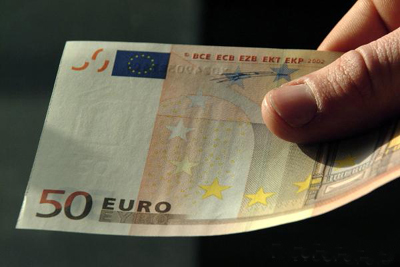Monday, 30 March 2015 20:05
 LONDON: The euro fell on Monday, hurt by uncertainty over whether Greece and its creditors will be able to strike a deal that will help Athens secure funding before it runs out of money by April 20.
LONDON: The euro fell on Monday, hurt by uncertainty over whether Greece and its creditors will be able to strike a deal that will help Athens secure funding before it runs out of money by April 20.
Talks continued through the weekend and Athens sounded upbeat, but its lenders said compiling a list of reforms could take several more days. Fitch cut Greece’s credit rating to ‘CCC’ from ‘B’ on Friday.
The dollar rose after Federal Reserve chair Janet Yellen underscored the view that the Fed is likely to start raising interest rates gradually later this year.
The dollar rose 0.5 percent to 119.78 yen, while the euro fell 0.6 percent to $ 1.0830 as it pulls away from a 12-year trough of $ 1.0457.
“Even though euro short positions are at record highs, given the Greek uncertainty and the bias for more monetary injection by the European Central Bank, the path for least resistance is a lower euro/dollar,” said Jeremy Stretch, head of currency strategy at CIBC World Markets.
“Unless the euro drops below $ 1.0770 we could see ranged trading, but with the Fed still looking to raise rates, we could see conditions later this week that are more helpful for overall dollar strength.”
The euro got little help from data that showed consumer prices in Germany picking up. Prices are set to rise in March after falling in the first two months of this year, but inflation is still likely to remain low.
“It is a lot more complicated than just looking at Germany. Yes, we need to see higher inflation in Germany, which would help a price adjustment, but at best better German data is just going to halt the euro decline rather than reverse it,” said Simon Smith, chief economist at FxPro.
For the dollar, U.S. jobs data on Friday will be the key event this week. A robust report could see investors position for tighter monetary policy sooner rather than later.
In a speech on Friday, Yellen outlined the case for a ‘gradualist approach’ to rate hikes, mirroring comments after the FOMC meeting on March 18. She signalled the Fed is likely to start raising rates later this year but said policy tightening could “speed up, slow down, pause, or even reverse course” depending on developments in the economy.
“The jobs numbers are going to be important, but I don’t think they will be the deciding factor determining when the Fed does eventually put rates up,” Smith said.
Copyright Reuters, 2015




























